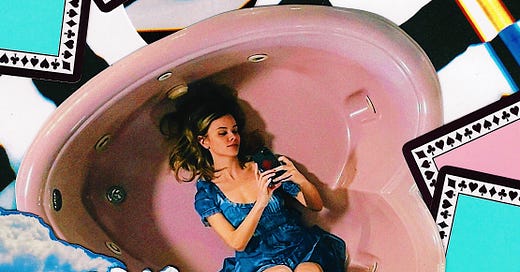Tumblr Nostalgia + the Passivity of Today’s Social Media
we've lost access to the intensity of others’ obsessions
It’s nearly official. Our Y2K obsession has fermented into something grittier. Our new counterculture, composed neatly of Indie Sleaze, Kendall Jenner’s resurrected Instagram, and preteens with flip phones, is headlined by a frenzy for the Tumblr aesthetic.
Seething for something beyond the inescapable “clean girl”, ultra-sterilized aesthetics of the new internet, our nostalgia for Tumblr’s prodigal heyday and all the strangeness that came with it is not only a lament for “simpler times” but a sign of viciously growing fatigue.
No longer an arena of democratic heights and follies, the internet is now old enough for people to remember and mourn its earlier, unbridled versions. The Tumblr of the early 2010’s was enthusiastically idealistic. It presented a dreamy vision of the internet as a community of niches, some of which were allowed to grow quite dark and unsightly. A kind of rite of passage for today’s adult generation, Tumblr allowed adolescents once trapped in their physical lonesomeness to access, for better or worse, the intensity of others’ emotions and obsessions.
I, who never opened social media until late high school, look back at Tumblr’s peak through my peers as they mourn the raunch and community of their digital adolescence. A friend tried to explain it to me:
“It was probably the worst thing on the planet,” She said. “We were all mentally ill and what, thirteen? Fourteen? People were in love with self-harm, it was horrible. I miss it a lot.”
She pulled up old posts to prove her point. They were hideously grayscale gorgon heads of gristle lens and red text. Confessions rendered in choppy arial font revealed the dramatics of youth exposed perhaps for the first time in history to the popularized mention of depression, anxiety, isolation, and angst. Just beyond the poignant ugliness of these artifacts, however, I caught a glimpse into a colorful milieu. On opening the platform, I’m assaulted by thousands of subgenres and their devotees, a kind of resistance against today’s impersonal doom-scrolling and I, too, miss something.
Which is not to say that we should turn again to that endless promotion of suicidal pre-adolescence. However, the lack of these dark memes on your Home Page is also not a sign that the sentiments that bred them don’t exist. They do, only beneath the carefully polished gleam of today’s cleansed social media. Platforms that rely heavily on visuals have created a strict taboo. Most posts are curated into striking conformity, with influencers releasing feed templates and layouts. While the profiles of our closest friends might lack the hypocrisy of most influencers, how often is the average Instagram user exposed to their friends’ content? Most home pages are swallowed by influencers who make a living presenting lives as homologous and far from the intense, unkempt dramatics of reality as possible. Outside of their ultra-curated feed, it has become almost impossible to deal intensely with life online without feeling mockery, a thousand strong, beating on one’s door.
For example, it is newly suspect to enjoy activities. Reading in cafes is now performative, artistry is available to the criticism of the many, who, steeped in nihilism, ask most often, what’s the point doing it at all? To post anything on social media as a non-influencer is to be seen with suspicion: Are you grasping fame or expressing yourself? Still, we can recollect a simpler, more precarious time and this seems to be breaking through the icy surface of our digital addiction.
Even generations brought up online have grown aware of their love-hate relationship to the internet. We’re made to watch, enraged and fooled, as fake jets are hired to inspire jealousy in us dear plebeians and influencer mansions are rented out to teeming crowds of twenty-year-olds who use these pictures to manufacture an experience that claims all the beauty of artifact while failing utterly to demonstrate merit. We’re addicted to muted tones and the endless spittle of people we grow very quickly to resist and detest for their hypocrisy, egocentrism and repetition.
While hypocrisy is beginning to knock down The Influencer, what comes to take its place is, horrifically, not the dark Innocent of the Tumblr age but a powerful accomplice of dictatorship. It has all gotten out of our hands, seems to be the popular lament. AI, passive, unstoppable consumerism, it seems to have washed over us like a riptide and drowning in the sea of the conglomerate, many are striving for a breath of careless expression.
Once a breeding ground for fan theories and unleashed, black lagoon dreamscape artwork, devastating neurosis, and truly niche aesthetic beyond micro-trends, early Tumblr has indeed instated itself as an institution—but one that has become more and more remote to us, like literary salons and recreation spaces.
And what really was the death of the Tumblr digital age? Did the internet’s ability to criticize, destroy, and distress plunge us all into the darkness of inexpression? Can it be traced back to the major moguls as they loom over us in their penthouses? Is it simply the natural progression of our society to discard what no longer serves us, and is the Tumblr dream still alive elsewhere, on other platforms, other media? Will we find ourselves in our nostalgia perhaps taking a stance against the gray forces which encroach upon us?
Addicted, miserable, and isolated without the catharsis of a horridly rendered image to release us, the Tumblr generation left the internet of their childhood behind and entered the arena of this new beast. Beneath the complacency of hours long screen time markers, many are indeed assailed by a kind of bubbling wrath towards new digital platforms. In the passivity which constrains us, the desire for individualized, unpolished irreverence may at least offer moments of relief for the unsponsored media user.






great read! i wasn't on tumblr as a teen but experienced it secondhand through pinterest in the early 2010s. back then it felt like the internet was built for exploring, while now, with how hyper-specific algorithms have gotten, it's just a place to be comforted by the same things. i've found all aspects of the internet, not just social media, have taken on this switch. of course, we're all perfectly able to navigate beyond the algorithm and make the internet discoverable again, but that takes a more effort on our part.
Algo, love your writing style!